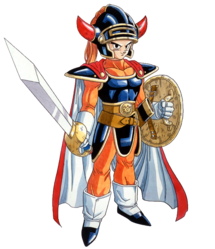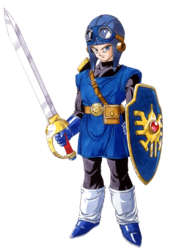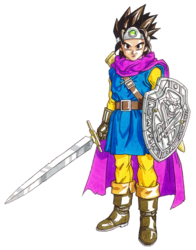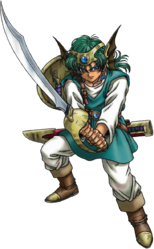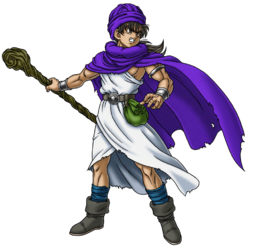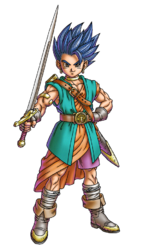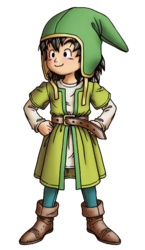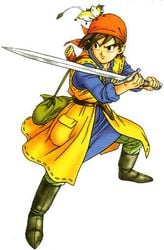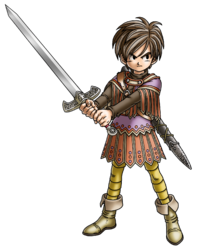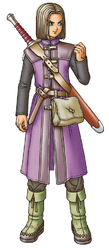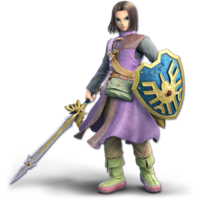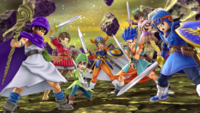Hero: Difference between revisions
(→As a playable character: adding in the names of the playable heroes based on consensus. The other 7 are for another day) |
m (→Assist role: Clarified which ones were which on the Final Smash image) |
||
| Line 120: | Line 120: | ||
===Assist role=== | ===Assist role=== | ||
[[File:Heroes.png|thumb|right|Other Heroes in Hero's Final Smash.]] | [[File:Heroes.png|thumb|right|Other Heroes in Hero's Final Smash. From left to right: V, X, VII, I, VI, IX, and II. | ||
]] | |||
Other iterations of the ''Dragon Quest'' Heroes also appear in [[Hero's Final Smash]]. | Other iterations of the ''Dragon Quest'' Heroes also appear in [[Hero's Final Smash]]. | ||
The seven other iterations are: | The seven other iterations are: | ||
*The protagonist of ''Dragon Quest I''. | *The protagonist of ''Dragon Quest I''. | ||
Revision as of 13:50, June 17, 2019
- For fighter info, see Hero (SSBU).
| Hero | |
|---|---|
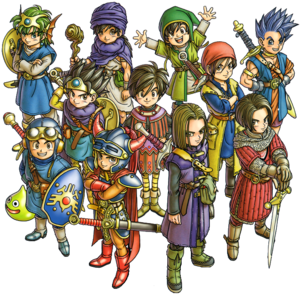  Official artwork of the Heroes from the first 11 installments of the Dragon Quest series. | |
| Universe | Dragon Quest |
| Debut | Dragon Quest (1986) |
| Smash Bros. appearances | Ultimate |
| Most recent non-Smash appearance | Dragon Quest XI (2017) |
| Console/platform of origin | Nintendo Entertainment System |
| Created by | Yuji Horii |
| Designed by | Akira Toriyama |
| Article on Dragon Quest Wiki | Hero |
Hero (勇者, Hero) is a title given to the protagonists from the Dragon Quest franchise.
Origin
The "Hero" is a collective title given to the protagonists of the Dragon Quest series, as their name (and in some cases, gender) is chosen by the player. The Hero is typically the most well-rounded character accessible to the player, skilled with both swordplay and magic. They typically have a wide range of equipment available to them, including the most powerful weapons and armor. As a result, the Hero is generally the character that the player will use the most throughout their quest.
Dragon Quest
The Hero is given the title "Scion of Erdrick" (ロトの血を引く者, Scion of Loto) in Theatrhythm Dragon Quest and Dragon Quest Rivals.
His name in the Japanese CD Theater audio drama and novelization is Alef (アレフ). Alef is borrowed from Alefgard (アレフガルド), the geographical name of the game's world. He is uncommonly referred to as simply Erdrick (ロト, Loto), though the protagonist of Dragon Quest III is more commonly associated with this title.
The Hero does not have much character, simply being a stoic, silent hero for the player to assume the role of. He had an audience with the king of Alefgard, left for a dangerous journey and rescued Princess Gwalin, defeating the Dragonlord and bringing the world to peace. Dragon Quest Builders, which takes place in an alternate timeline where the Hero instead joins forces with the Dragonlord, depicts him as a crazed villain who resides in a small fortress, believing himself to be the king of the world.
Dragon Quest II
The Hero is known as the "Prince of Midenhall" (ローレシアの王子, Prince of Lorasia), a title also used in Theatrhythm Dragon Quest. Midenhall was established by the Scion of Erdrick, making the Prince a direct descendant to the original Hero.
His name in the audio drama and novelizations is Allen (アレン). The default name in the Japanese Wii version is Loran (ロラン). Loran is borrowed from Lorasia (ローレシア), the Japanese name for Midenhall.
Similar to the Dragon Quest Hero, the Prince does not have much personality, but is shown through his actions to be incredibly strong-willed and eager to defend his kingdom from the villainous cult leader, Hargon. He is joined by the Prince of Cannock and the Princess of Moonbrooke in his quest. Unlike most other Heroes, he does not possess any magic capabilities.
Dragon Quest III
The Hero is given the title "Legendary Hero" (伝説の勇者) in Theatrhythm Dragon Quest. However, at the end of their adventure in Dragon Quest III, the Hero receives the title of Erdrick (ロト, Loto), which is widely considered to be their definitive name. They are the first Hero to have male and female variations, though neither choice affects the story in a major way.
Erdrick is a fabled Hero in the lore of the Dragon Quest universe, known for their bravery in saving Alefgard and its surrounding lands from both the Archfiend Baramos and the Master Archfiend Zoma. They are the ancestor of the Heroes from Dragon Quest and, by extension, Dragon Quest II. These characters belong to a group known as the "Descendants of Erdrick" (ロトの子孫たち, Descendants of Loto).
Dragon Quest IV
The name given to the Hero is Solo (ソロ) for the male and Sofia (ソフィア) for the female. In the audio drama, the Hero is named Rei (レイ), and in the official novelizations his name is Yuuril (ユーリル).
From a young age, the Hero was prophesied to defeat the Demons and restore peace to the world. They were raised by foster parents in a hidden village, protected from the outside world until they became an adult. Following a failed assassination attempt led by Psaro the Manslayer, the 18-year-old Hero finds themselves alone in a ransacked village. They soon set out on a quest to discover their true identity and fulfill the prophecy.
Dragon Quest V
The Hero is given the title "Legendary Monster Tamer" (伝説の魔物使い) in Theatrhythm Dragon Quest.
The default name for the Hero in-game in Japanese is Abel (アベル). The Hero's father initially suggests the name Madason (トンヌラ, Tonnura), but soon changes his mind; regardless, the name is commonly used by fans to distinguish him. In the audio drama and the official novelizations, he is named Lucas (リュカ).
The Hero is, interestingly, not the chosen Legendary Hero; rather, it is his union with his future bride that involves him with the prophecy to defeat the villainous Order of Zugzwang. Nonetheless, he possesses extraordinary bravery and a captivating presence that often convinces monsters to join his side. In battle, he uniquely wields a staff as his main weapon, rather than a sword.
Dragon Quest VI
The Hero is known as the "Prince of Somnia" (レイドック王子).
He has many official names in Japanese. The default name for him in the games is Reck (レック), which is derived from the Japanese name of his kingdom, Reidock (レイドック). In the audio drama, his name is Will (ウィル); in the manga, his name is Botts (ボッツ); in the novelization, his name is Iza (イザ).
Upon awakening from a strange dream where he conflicts with an evil Dread King, this amnesiac and seemingly-average boy soon discovers he is part of a larger prophecy. His adventure through the kingdom of Somnia sees him exploring the parallel Dream World, meeting familiar companions, and ultimately coming to terms with his true identity.
Dragon Quest VII
In the official manga, the Hero's name is Arus (アルス). For the English release of the 3DS version and in English promotional material, he is given the default name Auster.
The Hero is much pluckier than his counterparts; he is the young son of a respected fisherman, and something of a doormat, allowing others to easily take advantage of him. When events transpire that transport him and his companions into the distant past, he and his companions quest to defeat the Demon King Orgodemir and restore a broken timeline.
Dragon Quest VIII
In the manual for the PS2 version and in promotional screenshots, the Hero is given the default name Eight (エイト). His ally, Yangus, calls him "guv" as an informal nickname.
The Hero is an amnesiac who lives in Trodain Castle, serving as the captain of its guard upon becoming an adult. He is always accompanied by a small mouse-like creature named Munchie. After the villainous court jester Dhoulmagus sets a curse on the land of Trodain, the unaffected hero and his companions set out to defeat him, ultimately learning about his origins and the true nature of the curse.
Dragon Quest IX
The Hero is commonly referred to as Nine (ナイン).
The Hero belongs to the Celestrians, a race of angelic guardian deities that watch over humanity, perform good deeds, and tend to Yggdrasil—the world tree that allows for Celestrians to ascend to the Realms of the Almighty. However, disaster soon strikes, causing the Hero to fall to Earth and become a regular, mortal human. With a party of other travelers, the Hero roams the Earth to assist those in need and eventually return home.
Dragon Quest X
The Hero is commonly referred to as Ten (テン).
Both the Hero and their sibling live in the small village of Etene. During a raid on the village, said sibling is kidnapped by monsters, and the Hero is killed in an explosion. The Hero's soul is then revived as one of five non-human species, launching a nontraditional quest in the world of Astordia.
Dragon Quest XI
The Hero is known by his title, the Luminary (勇者, Hero). He is also commonly referred to as Eleven (イレブン).
The Luminary is said to be the reincarnation of a legendary warrior who defeated the darkness. On his sixteenth birthday, he participates in a coming-of-age ceremony, then sets out on a journey to fulfill his destiny. However, he conflicts with the Kingdom of Helidor, as its king instead believes he is the Darkspawn, an entity doomed to spread darkness across the world.
In Super Smash Bros. Ultimate
As a playable character
During the E3 2019 Nintendo Direct, the Hero was confirmed to be included into Super Smash Bros. Ultimate as a DLC Fighter alongside Banjo & Kazooie. The Hero is planned to be released in Summer 2019 along with one stage and several music tracks from the Dragon Quest series as part of Challenger Pack 2.
The Hero is represented through four separate iterations, which are selectable through alternate costumes. The playable iterations are:
- Luminary, the protagonist of Dragon Quest XI, who serves as the default costume.
- Erdrick, the male protagonist from Dragon Quest III.
- Solo, the male protagonist from Dragon Quest IV.
- Eight, the protagonist of Dragon Quest VIII.
Assist role
Other iterations of the Dragon Quest Heroes also appear in Hero's Final Smash. The seven other iterations are:
- The protagonist of Dragon Quest I.
- The protagonist of Dragon Quest II.
- The protagonist of Dragon Quest V.
- The protagonist of Dragon Quest VI.
- The protagonist of Dragon Quest VII.
- The male protagonist of Dragon Quest IX.
- The male protagonist of Dragon Quest X.
Trivia
- Due to Dragon Quest XI being released in July 2017, the Hero (specifically the iteration from that installment, Luminary) is the most recently debuted character in the Super Smash Bros. series.
- The Hero and Cloud each represent one of the two companies that merged in Square Enix, as Cloud was from Squaresoft and the Hero was from Enix.
- The Hero is the first and only character in the Super Smash Bros. series to simultaneously originate from both a Nintendo console (Nintendo 3DS) and a non-Nintendo console (PlayStation 4).
- He is the first playable third-party character whose alternate costumes replace his model with a different character.
- While several characters are given generic names (namely, Villager, Pokémon Trainer, and Inkling) because of the ambiguity of their name in their own universe (owing to the fact that the player can decide their name), the Hero instead chooses not to use any given name (despite three of them having official names in Dragon Quest media) and use the generic title of "Hero" instead, unlike Bowser Jr..
- This makes them the only third party characters with this trait.
- Erdrick and Solo are the only characters that don't have an opposite gender alternate costume in Ultimate, but can change gender in their own games.
- The Hero is the second known third-party avatar-based character in Super Smash Bros., the first being Joker.
- The Hero is the first and only playable character in the Super Smash Bros. series whose Japanese name is written entirely with kanji.
- The Hero from Dragon Quest V is the only iteration that is not depicted welding a sword. He instead wields a staff.
|
| |
|---|---|
| Fighter | Hero (SSBU) (XI, III, IV, VIII) |
| Stage | Yggdrasil's Altar |
| Other | Hero (I, II, V, VI, VII, IX, X) · Martial Artist · Mimic · Slime · Veronica |
| Spirits | Spirits |
| Music | Ultimate |

